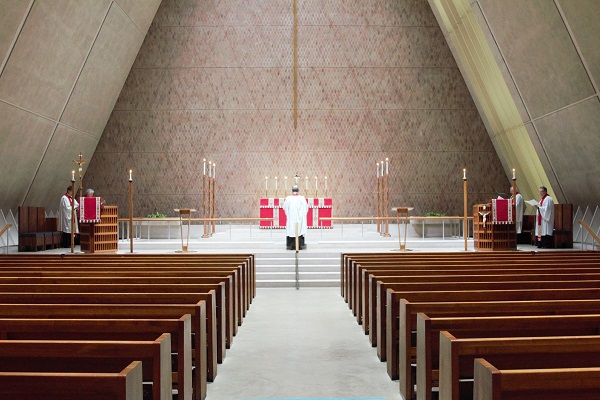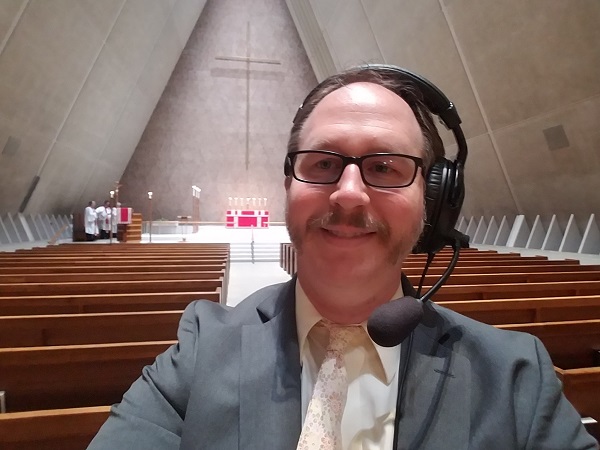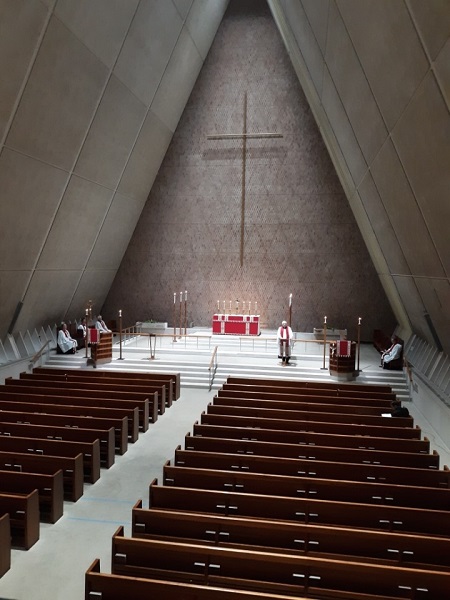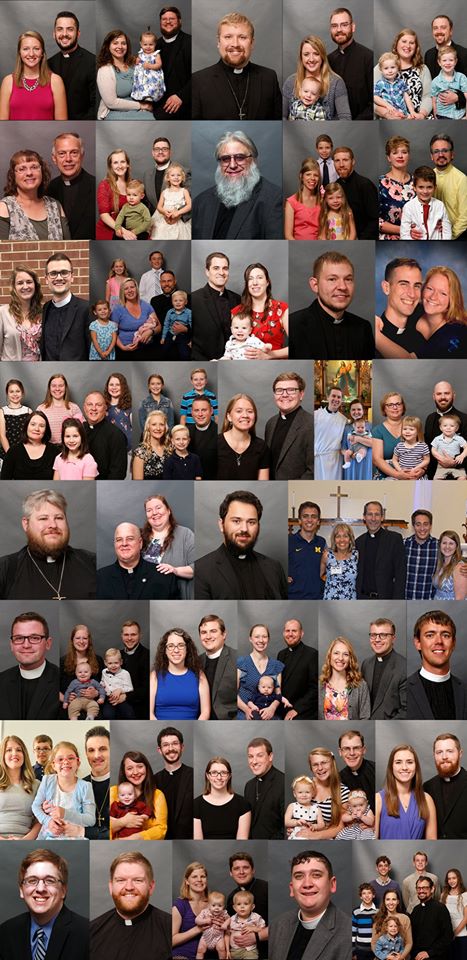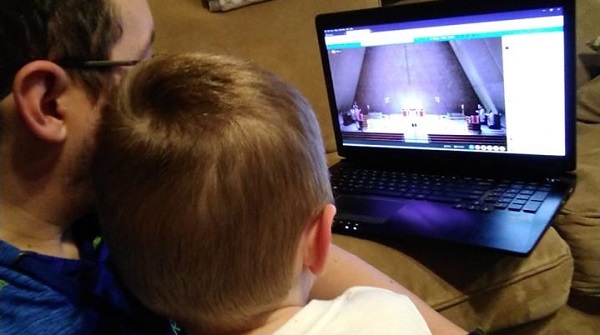
Now faith is the assurance of the things hoped, the conviction of things not seen.
Hebrews 11:1
On March 12, President Rast chose, with the input of the Seminary’s leadership team, to move to online delivery of education for the beginning of the spring quarter. “As the weeks are turning into months, I can tell you that I have never made a more difficult or disappointing decision,” said the Rev. Dr. Lawrence R. Rast Jr. on April 30, in his sermon at the combined 2020 Vicarage and Deaconess Intern and Placement and 2020 Call Service at Concordia Theological Seminary, Fort Wayne (CTSFW). “Our congregations have, in many cases, not been able to meet, or have done so under the most difficult circumstances. We grow impatient to be together, and understandably so, for it is toward evening and the day is almost over.”
And yet he also could, and with joy, open the service with this familiar greeting: “Alleluia! Christ is risen. He is risen indeed, Alleluia.”
The story of the Seminary’s perhaps most unique Call Night—the pews empty, the entire congregation, save for five faculty members conducting the service in Kramer Chapel, online—is one that can be told best in their own words. “Things have changed dramatically over the past several weeks for all of us—that is certainly evident in the empty pews that are in this chapel,” Dr. Rast continued in his opening greeting. “Yet even now, as we prepare to send out new vicars, deaconess interns and candidates, and pastors, much is the same.”
Thousands in the Church joined the service from the world over, from all 50 states alongside our brothers and sisters in Christ across six continents. This year’s 40 pastoral candidates watched the service on a combined Zoom Meeting, which was shown at times throughout the Vespers service.
In his sermon, Dr. Rast preached on the Emmaus passage from Luke 24:13-35. From verse 21:
“We had hoped.” The finality of the disciples’ words is overwhelming. All they had worked for, hoped for, prepared for over the course of a number of years was now ended, finished. Their hopes were wrecked, their dreams unrealized, their expectations dashed…
Yet as they trudge along, they are joined by an unrecognized companion who engages them in what may be the most ironic conversation recorded in all of the Scriptures. Ironic because we know who He is and what the outcome will be. But our downcast disciples are kept from recognizing their friend…But why? Why could they not recognize him? And the answer is simply this: so Jesus could reveal himself to them in the midst of their human weakness and within the context of their profound challenges, as He always does through the Scriptures and the breaking of the bread…
We [too] had hoped. We—students, families, congregations, staff, faculty—we are the disappointed disciples this evening. This sanctuary was supposed to be full; full of pastoral and deaconess candidates, vicars and interns, their family, friends, all expectantly waiting for news of pastoral calls, deaconess placements, vicarage assignments, deaconess internships. There is no noisier place on this campus than this chapel before Call Service every year. Tonight, it is silent. Yes, there’s a skeleton crew (I use the language intentionally), who sends this service out to a scattered community that is still largely sheltering in place, but it is not what we hoped for.
Our feet drag as we plod through a quarter unlike any in the nearly 175 year history of this school. We trudged into this virtual call service that lacks the fulfillment only a gathered community can provide. Where previously there had been hopeful anticipation, now there is disappointment. “And they stood still, looking sad.” That could be us.
But it cannot be us. Because we have hope. We hope because we know and believe the outcome of Jesus’ story. We know that Christ is risen: he is risen indeed! Alleluia. Tonight is different, no doubt. There has never been a call night, vicarage assignment, deaconess placement and internship service like this. We expected something quite different. We had hoped we could do things the way we had traditionally done them. But no. Still, tonight is no different than those other nights in this most important respect: for 174 years, Christ has called men to pastoral service in his name; he will do so again in mere moments. Christ has formed servants for service in his name and diaconal positions. He continues to do so. Christ continues to form servants through vicarages and internships. This very night the work of Christ continues. He is faithful.
The Rev. Dr. Gary W. Zieroth, Director of Vicarage, announced vicarages for 34 Master of Divinity (MDiv) students and one Alternate Route student. “Dear brothers in Christ,” he began, “As you hear your names called, remember the words from Deuteronomy 31:6: ‘Be strong and courageous. Do not be afraid or terrified because of them, for the Lord your God goes with you. He will never leave you or forsake you.’”
Four deaconess internships were announced, as were two deaconess placements. In his introduction before their distribution, the Rev. Dr. James G. Bushur, Director of Deaconess Studies, explained the role of deaconesses in the Church:
The Gospel of divine mercy does not begin with God speaking, but with His hearing. Mercy begins when He hears the blood of Abel crying out from the dirt; when He hears the desperate pleas of His children in Egyptian bondage; when He hears the groans of Jonah from the belly of the fish. Indeed, dear friends, the joy that is ours this Easter season is found in the intercessory blood of Jesus, which speaks better things than that of Abel. Indeed, it is this blood that even now continues to speak before the father ever moving Him toward mercy.
And so it is for this reason that we count it a great blessing on this campus to participate in the formation of both pastors and deaconesses. If pastors are called to speak, deaconesses are formed to hear, to be—shall we say—the ears of God. The deaconess vocation is about perceiving the need of our neighbor, and in responding to those needs with the salutary fellowship of Christ’s body the Church. And so deaconesses serve so that the cries of the aborted and the abused, the afflicted, the hungry, the lonely, the oppressed, and the sick are heard by the Church, a hearing which then comes before our heavenly Father and invites His mercy. How profound the need for this vocation is in our day.
The Rev. Dr. Jeffrey H. Pulse finished the night’s distributions with the announcement of 40 pastoral calls. “So where does one begin?” he asked. “I spent considerable time, which I seem to have a bit of right now, trying to sort out the beginning of this address. ‘It was the best of times; it was the worst of times.’ Already been done. ‘These are extraordinary times we find ourselves in.’ Already been overdone. ‘Even though we cannot be together, in fact, we are always united in spirit.’ Blah, blah blah…
The most important realities have not changed at all. The Church still needs workers in the harvest field. The congregations still need pastors to carry out Word and Sacrament ministry. The Seminary still needs to get rid of you so we can bring in another class. And because these things do not—have not—changed, I have good news for our Church Body, good news for your Seminary, and really good news for all of you: all 40 students who are ready to be placed are receiving a call this evening…
This year, there are 36 MDiv candidates and four Alternate Route candidates from our Seminary for a total of 40, and 52 MDiv candidates and four Alternate Route candidates from our sister seminary in St. Louis. Combine this with SMP, CHS, CMCEIIT—those students—then we have a total of 103 candidates: 96 MDiv and Alternate Route. There were 129 calls available for us and 100 calls extended, as well as one for a colloquy candidate. That leaves 28 calls available and not used. This is actually a few more than last year, so the need for pastors continues. We would ask for your prayers, of course, for those congregations not receiving a candidate at this time.
As always, the announcements of the pastoral calls ended with the Charge to the Candidates for the Holy Ministry. These 40 men rose from where they were sheltering in place, standing in apartments and houses and churches across the nation. “Go then, take heed unto thyself and to all the flock over which the Holy Ghost hath made thee overseer,” Dr. Rast began the charge, finishing with, “The Lord bless thee from on high, and make thee a blessing unto many, that thou mayest bring forth fruit and that thy fruit may remain unto eternal life. Amen.”
The answering, “Amens!” were scattered by the technological challenges of syncing 40 voices separated by distance, but spoken in the same truth and promise as those in every generation of pastors in the 173 years before them. Thanks be to God!
To re-watch the service, view the map for where these 81 men and women are headed, and to access the pdf lists for the 2020 Vicarage Placements, Deaconess Internships, Pastoral Calls, and Deaconess Placements, go to https://callday.ctsfw.edu.
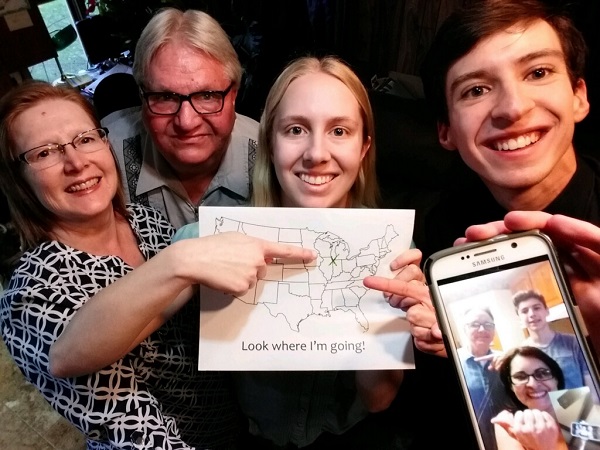

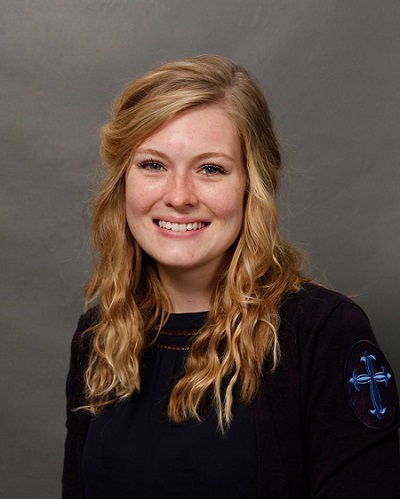 Last month, shortly after the COVID-19 shutdown, we received the following message from Rev. Derek Wolter, Chaplain at the Lutheran Home & Harwood Place in Milwaukee, Wisconsin. He wrote to boast of his deaconess intern, Anna Miels, who is in our Master of Arts (Leading to Deaconess Certification) Program. She began her internship at Lutheran Home & Harwood Place in January 2020.
Last month, shortly after the COVID-19 shutdown, we received the following message from Rev. Derek Wolter, Chaplain at the Lutheran Home & Harwood Place in Milwaukee, Wisconsin. He wrote to boast of his deaconess intern, Anna Miels, who is in our Master of Arts (Leading to Deaconess Certification) Program. She began her internship at Lutheran Home & Harwood Place in January 2020.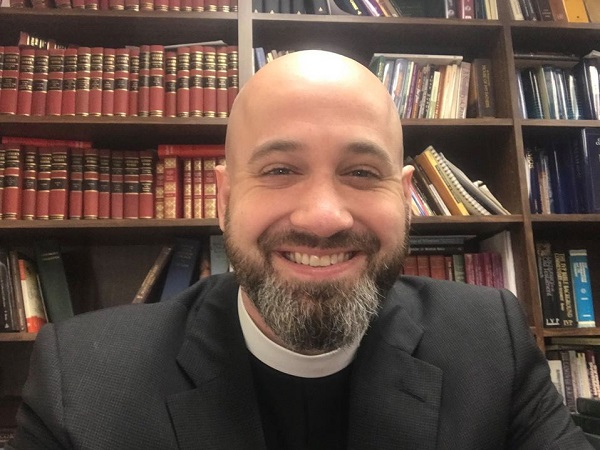
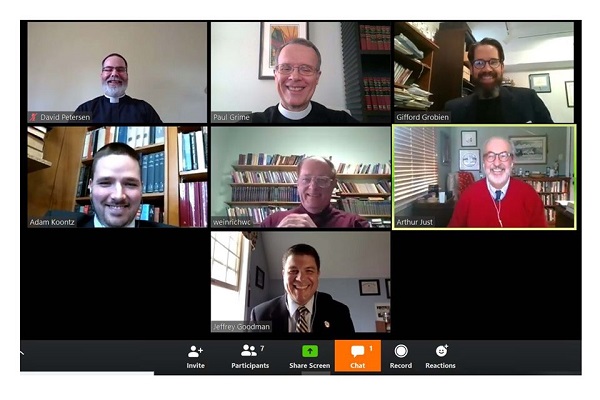
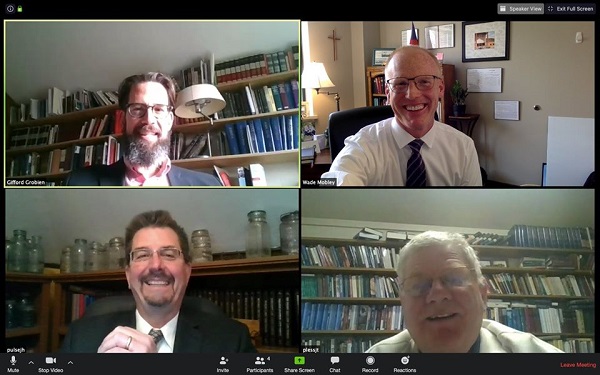
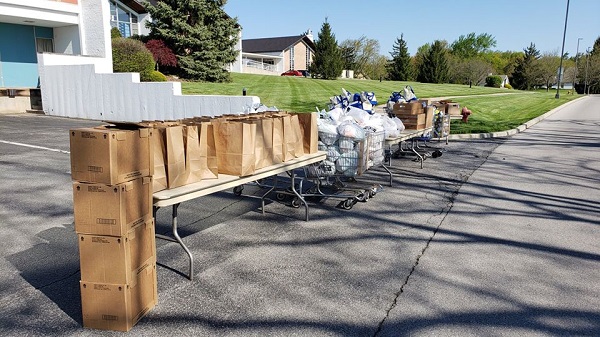
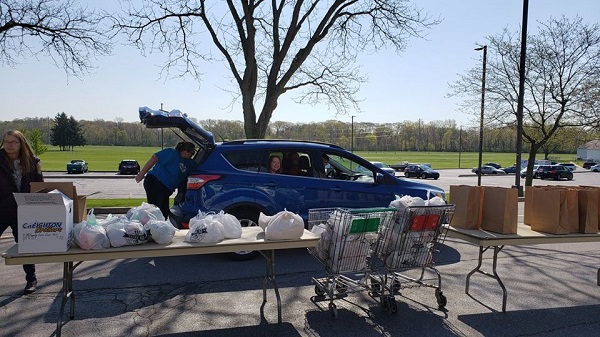
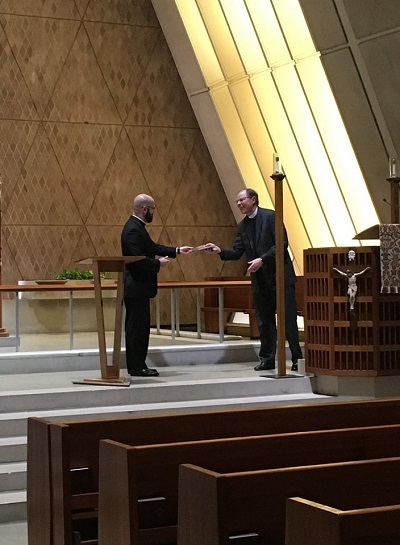 Today after chapel, Dr. Charles Gieschen, Academic Dean, presented the annual academic awards at CTSFW. You can still watch the presentation at the end of today’s daily chapel service either here on Facebook or at
Today after chapel, Dr. Charles Gieschen, Academic Dean, presented the annual academic awards at CTSFW. You can still watch the presentation at the end of today’s daily chapel service either here on Facebook or at 

